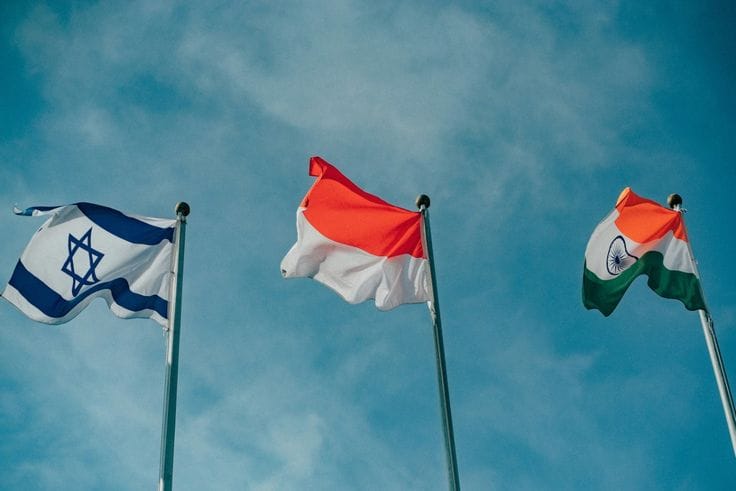Countdown to Conflict: Israel Warns India and Allies of Impending Strike on Iran—World Awaits Next Move…
In a rapidly unfolding development, Israel has reportedly issued warnings to India and other key allies about an imminent military strike on Iran. The news has sent shockwaves across the globe, escalating tensions to a fever pitch and placing the international community on high alert. As the world braces for what could be a monumental shift in the Middle East’s geopolitical landscape, concerns of a broader conflict loom large. With whispers of war circulating, speculation is rampant about what will come next, and the global consequences of such an action are becoming increasingly difficult to ignore.
The Context Behind Israel’s Warning

The roots of Israel’s tension with Iran are long-standing and multi-faceted, stretching back decades. At the core of their conflict is Iran’s nuclear program, which Israel has long viewed as an existential threat. Israel, a nation born from the ashes of the Holocaust, has a heightened sense of national security and sees Iran’s pursuit of nuclear capabilities as intolerable. Over the years, Israeli leaders have repeatedly made it clear that they would not hesitate to take military action to prevent Iran from acquiring nuclear weapons.
Israel has been closely monitoring Iran’s nuclear progress, and according to reports, Israeli intelligence indicates that Iran is on the brink of developing a nuclear bomb. This “breakout” capability—the point at which Iran could quickly assemble a weapon—has crossed Israel’s red line, triggering the nation’s latest move toward military action. By warning India and other allies, Israel seems to be signaling that it is prepared to take matters into its own hands if diplomatic solutions fail to materialize.
India’s Stake in the Conflict
India’s inclusion in Israel’s warnings underscores the broader international implications of a possible Israeli-Iranian conflict. India, a major global power with deep strategic interests in both the Middle East and its relationship with Israel, faces a delicate balancing act.
India has long had friendly relations with both Israel and Iran. On one hand, Israel is a key defense partner for India, providing advanced military technology and intelligence cooperation. On the other, Iran is an important source of energy for India, and the two countries share economic and cultural ties that span centuries. In recent years, India has also been involved in critical infrastructure projects in Iran, such as the development of the Chabahar Port, which is pivotal for India’s access to Afghanistan and Central Asia.
Given its interests, India finds itself in a precarious position. While it may sympathize with Israel’s security concerns, India also relies on its partnership with Iran, especially for energy imports. A conflict in the Middle East would disrupt oil supplies, significantly affecting India’s economy, which is heavily dependent on energy imports from the region. New Delhi is likely to push for a diplomatic resolution, but as the clock ticks, the path forward remains unclear.
The Geopolitical Ramifications
If Israel launches a strike on Iran, the immediate concern is the possibility of a massive regional war. Iran has already vowed to retaliate if attacked, and it possesses the capability to do so in devastating ways. Iranian leaders have frequently warned that they could strike Israeli cities, military installations, and strategic infrastructure in response to any military action.
Furthermore, Iran has powerful proxies across the Middle East, including Hezbollah in Lebanon, militias in Iraq, and the Houthis in Yemen, all of which could be mobilized to target Israeli interests and U.S. military forces in the region. Hezbollah, in particular, has tens of thousands of rockets aimed at Israel, and a direct conflict could lead to massive casualties and destruction on both sides.
The ripple effects of such a conflict would also extend far beyond the region. The United States, Israel’s closest ally, would likely be drawn into the conflict. Although U.S. President Joe Biden has expressed reluctance to become embroiled in another major Middle Eastern war, the U.S. would find it hard to stay on the sidelines if Iran targets Israel or U.S. troops in the region. This could lead to a broader military engagement, further destabilizing an already volatile region.
Russia and China, both of whom have closer relations with Iran, could also find themselves entangled in the conflict. Russia, with its military presence in Syria and strategic alliance with Iran, might be forced to take a more active role, either diplomatically or militarily. China, while less involved militarily, has significant economic interests in Iran, particularly in terms of oil imports. Both countries would likely attempt to de-escalate the situation, but their efforts could be undermined by the rapidly unfolding events on the ground.
Global Economic Fallout
One of the most immediate global consequences of an Israeli strike on Iran would be economic. The Middle East is home to some of the world’s most important oil and gas reserves, and any disruption to the flow of energy supplies could have severe repercussions. The Strait of Hormuz, a narrow waterway through which one-fifth of the world’s oil supply passes, is particularly vulnerable. Iran has previously threatened to block the strait in retaliation for any military strikes, a move that would send oil prices soaring and destabilize the global economy.
Rising oil prices would have a cascading effect on inflation, further straining global markets that are still recovering from the COVID-19 pandemic and ongoing supply chain disruptions. Developing economies, which are more dependent on energy imports, would be particularly hard hit. Countries like India, which import large quantities of oil from the Middle East, could see fuel prices skyrocket, leading to inflationary pressures and economic instability.
In addition to the energy market, global trade routes would be disrupted, affecting industries worldwide. A prolonged conflict could also lead to increased military spending by nations wary of further instability, diverting resources away from critical areas like healthcare, education, and infrastructure.
The Diplomatic Path Forward
Despite the looming threat of conflict, diplomatic efforts to prevent an all-out war continue. The United Nations has called for emergency sessions to discuss the escalating situation, and behind-the-scenes negotiations are reportedly underway. European nations, which have been involved in the now-defunct Iran nuclear deal, are attempting to mediate between the parties, urging both sides to exercise restraint.
India, too, could play a role in mediating the crisis, leveraging its diplomatic ties with both Israel and Iran. As a global power with vested interests in maintaining peace in the region, India’s involvement in diplomatic efforts could prove crucial in de-escalating the situation.
However, with Israel reportedly preparing for military action, the window for diplomacy is closing fast. The next few days will be critical in determining whether the region—and possibly the world—can avoid a catastrophic war.
Conclusion…
The world now finds itself on the precipice of a potentially devastating conflict. As Israel warns India and other allies of an impending strike on Iran, the international community waits with bated breath to see what unfolds. A military conflict between these two regional powerhouses could have far-reaching consequences, affecting everything from global security to the world economy. With the stakes higher than ever, the next move will determine whether the Middle East, and possibly the world, is plunged into chaos or steered back toward diplomacy. To Know more about tech & International News visit once.

